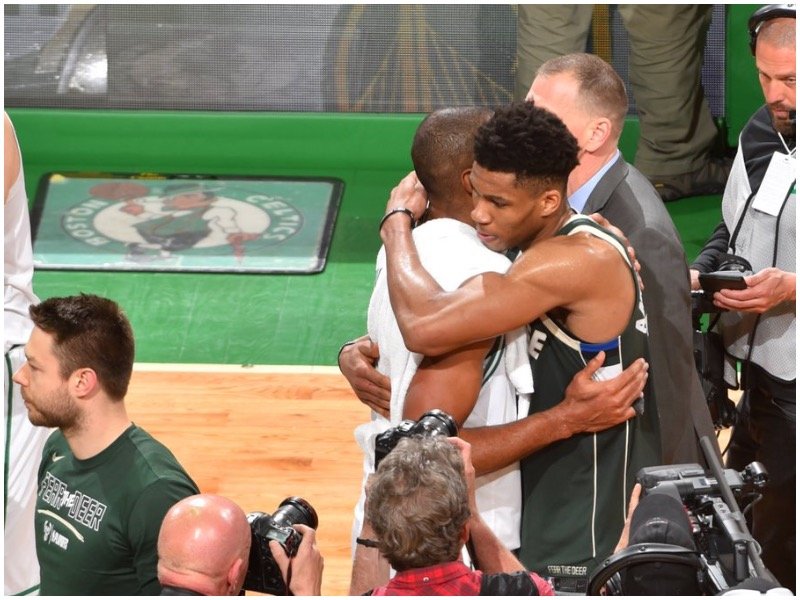In the biggest game of their season – their biggest game in 17 years – the Milwaukee Bucks reverted back to the most frustrating and least functioning version of themselves. And now their 2017-18 campaign is over, and the organization must look ahead to an offseason of questions and decisions – changes to problems that were exemplified, excruciatingly, in the Game 7 defeat in Boston.
The Bucks lost to the Celtics, 112-96, on Saturday night at TD Garden, dropping the first-round playoff series, four games to three. Second-seeded Boston advances to face the third-seeded Philadelphia 76ers, while No. 7 Milwaukee goes home to watch the remainder of the postseason and wonder about its franchise’s oft-mentioned future. The Bucks are now 0-7 all-time in playoff Game 7s, and they still have not won a playoff series since 2001.
Far too many of Milwaukee’s most-familiar flaws were on display Saturday, several of them entangled with each other. There were head-scratching coaching moves, including an apparent defensive strategy shift; an inability to rebound, defend the three-point line or protect the basket with physicality inside; inaccurate outside shooting, long cold stretches and an inexplicable 20-2 Boston run to close the first quarter.
There was crude, unimaginative and stagnant isolation-based offense, sloppy turnovers and unneeded fouls. One game after scoring 25 fast-break points, the Bucks had exactly zero in transition in Game 7; one game after getting 21 points from their bench, Bucks reserves other than Jabari Parker scored just three.
Indeed it was the consistently inconsistent, predictably unpredictable, "same old Bucks" performance Milwaukee fans have grown sadly accustomed to seeing. Throw in some questionable referee calls, a basket Giannis Antetokounmpo accidentally tipped in for the Celtics and Boston’s raucously rambunctious home crowd, and, from the end of the first quarter onward, it never really felt like it was going to be the Bucks’ night.
"I thought we were the better team, but unfortunately we cannot move to the second round," Antetokounmpo said afterward. "It was a good series, but we have a better team.
"I think, overall, we played hard, we gave everything we’ve got, we protected our home. We weren’t able to win on the road, but we pushed the series to Game 7. A lot of the guys in the locker room have never been in Game 7s. It's a new experience. Now we know now what it takes to win a Game 7. You've got to come out, hit first."
Eric Bledsoe came out and hit first, attacking and scoring six early points, but his aggressiveness soon became reckless. He picked up three quick fouls and was forced to the bench, as was Antetokounmpo, robbing Milwaukee of two of its most impactful players.
Meanwhile, Bledsoe’s counterpart, Terry Rozier, was steady in the first half and used the fourth quarter to officially claim victory in the trash-talking point-guard war Bledsoe started with him. Rozier finished with a career playoff-high 26 points, hitting 5 of 8 three-pointers, and adding nine assists, scoring or assisting on 30 of Boston’s 62 second-half points, smiling and laughing as he put on a basketball clinic for Bledsoe.
Inside, Celtics big man Al Horford did just about everything else, posting 26 points, eight rebounds and three assists, playmaking from the pivot and flexing on the Bucks’ helpless frontcourt. Rookie Jayson Tatum added 20 points, while top playoff scorer Jaylen Brown had just two before leaving the game with a hamstring injury in the first half.
"It's more than you can imagine, just a great feeling," Horford said. "Our fans really gave us that energy. This is why you work so hard in the regular season, to put yourself with home-court advantage."
The Bucks were outshot (53.6 to 47.3 field-goal percentage), outrebounded (42-32) and out-assisted (28-21). They made fewer three-pointers, had fewer points in the paint, committed more turnovers and were outscored from the bench, 33-12. It appeared Milwaukee had switched its (recently effective) defensive coverage on pick-and-rolls, leaving its bigs out of position – particularly center Thon Maker, who was back to being pedestrian after a couple of big games at the BMO Harris Bradley Center.
With Antetokounmpo and Bledsoe battling foul trouble, Khris Middleton was the lone bright spot for the Bucks on Saturday night. The team’s understated second banana scored a playoff career-high 32 points, hitting 5 of 9 three-pointers in 41 minutes. He finished the series shooting 59.8 percent from the field and 60.1 percent on threes.
While being subjected to "Who is Bledsoe?" chants, the Bucks point guard played his best game of the postseason, with 23 points, though he had just two assists and four turnovers. Antetokounmpo never really got going, scoring 22 points (on 7 of 17 shooting) with nine rebounds, five assists and four turnovers, playing a game-high 42 minutes despite picking up five fouls.
Antetokounmpo's fifth foul, on a Marcus Morris made three-pointer from the corner that put Boston up 78-65 with a minute left in the third quarter, felt like a major turning point. On the next possession, Tatum hit another three to put the Celtics up 81-65, and the Bucks never got within 12 the rest of the of the game.
Despite head coach Joe Prunty electing to use 11 players in a contest where teams’ rotations typically shrink to eight or nine, Milwaukee got almost nothing from its reserves. Parker scored nine, Terry added a single three-pointer, and that was it. The Bucks’ bench was a net negative-68 on Saturday, while the Celtics got contributions from Morris (10 points), Shane Larkin (eight), Aron Baynes (eight points, seven rebounds) and Marcus Smart (five points, four rebounds, six assists, three steals and his usual emotional energy and swagger).
"Extremely tough series, both teams battled every night," Prunty said. "The game was physical, I think the series was physical, which is typical for the playoffs."
Defensively, the Bucks once again looked lost and outcoached; offensively, they reverted to a game plan that comprised blindly attacking the basket most possessions and, occasionally, running a high pick-and-roll, abandoning the action and going isolation, with four players mostly watching the ball-handler (usually Giannis). It was uninspired and all too recognizable.
Prunty’s lineups also were dubious; at one point in the second half and with the game starting to get away, he bizarrely had Antetokounmpo, Parker, Matthew Dellavedova, Jason Terry and Shabazz Muhammad playing together.
"You have your rotations, you get a feel for how guys are playing when they enter the game and you have to make those adjustments on the fly," Prunty said. "You give the guys the opportunities and you see what the flow of the game is and how they feel out there and you make the decisions from there."
Brad Stevens, as was expected before the series and demonstrated throughout, proved to be the superior head coach. In fact, the Celtics as a team were superior. Milwaukee had the best player in the series in Antetokounmpo, but Boston collectively was much better – a deeper, smarter squad, more disciplined and with well-defined roles.
The Bucks possess tantalizing talent – especially if Middleton continues to play the way he did in the postseason – but their pieces don’t fit well, assets have been mismanaged and mistakes badly compounded. If the organization hopes to become the title contender it wants to be and not just a business-side behemoth, the basketball operations have to become more coherent, decisive and prudent – less easily assailable by fans and media who’ve become both empowered and exasperated by the team’s foreseeable missteps.
The Bucks need only watch the upcoming second-round playoff series between Boston and Philadelphia to see what they could be – a flourishing team with a good coach, shrewd front office, young talent and championship aspirations. But the precocious Celtics and 76ers are also a reminder that, regardless of the Bucks’ new arena and #OwnTheFuture mantra, the NBA won’t wait for Milwaukee to figure out how to be successful. And, now, it's on to a critical offseason.
Born in Milwaukee but a product of Shorewood High School (go ‘Hounds!) and Northwestern University (go ‘Cats!), Jimmy never knew the schoolboy bliss of cheering for a winning football, basketball or baseball team. So he ditched being a fan in order to cover sports professionally - occasionally objectively, always passionately. He's lived in Chicago, New York and Dallas, but now resides again in his beloved Brew City and is an ardent attacker of the notorious Milwaukee Inferiority Complex.
After interning at print publications like Birds and Blooms (official motto: "America's #1 backyard birding and gardening magazine!"), Sports Illustrated (unofficial motto: "Subscribe and save up to 90% off the cover price!") and The Dallas Morning News (a newspaper!), Jimmy worked for web outlets like CBSSports.com, where he was a Packers beat reporter, and FOX Sports Wisconsin, where he managed digital content. He's a proponent and frequent user of em dashes, parenthetical asides, descriptive appositives and, really, anything that makes his sentences longer and more needlessly complex.
Jimmy appreciates references to late '90s Brewers and Bucks players and is the curator of the unofficial John Jaha Hall of Fame. He also enjoys running, biking and soccer, but isn't too annoying about them. He writes about sports - both mainstream and unconventional - and non-sports, including history, music, food, art and even golf (just kidding!), and welcomes reader suggestions for off-the-beaten-path story ideas.







